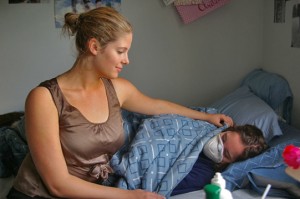Extreme measures to avoid extreme flu
January 13, 2010 by Katie Lawrence

In this photo illustration, Milana Jasper (left) and Heather Tijman are demonstrating one method of preventing the spread of the H1N1 virus by wearing a mask when being cared for.
How far would you go to avoid getting the H1N1 virus, more commonly known as swine flu?
Some countries have been taking extreme measures against the virus, but local health authorities say that’s not necessary.
• In April, Egypt ordered the slaughter of the country’s 300,000 pigs, believing it would calm people because pigs are seen as unclean, reported the Sydney Morning Herald.
• The majority of the Japanese public has worn masks since May to avoid the H1N1 virus, thousands of schools were closed and testing centres were flood with people, reported Foreign Policy magazine. Also, Japanese politicians have announced that they will not shake hands with anyone until the H1N1 scare has died down.
• The Big Gig Weekend festival at the Royal Bath and West Showground in Britain has taken out insurance of up to one million pounds for performers Katherine Jenkins, James Morrison, Boyzone and Diversity, in case they come down with the virus, reported the London Telegraph.
• According to l’Agence France-Presse (AFP), when a case of H1N1 was confirmed in a passenger coming from Mexico, Hong Kong quarantined the hotel where the traveller was staying, and tired to track down all the passengers who were on the plane with the man.
• China was prepared to close schools and convert a holiday camp into a quarantine centre when the virus hit the country, reported AFP.
• The Local (Sweden) reported that some Swedish churches have started serving fortified wine at communion, hoping that it will reduce the risk of the spread of H1N1, while others have advised Swedish faithful not to attend communion.
But all the action that needs to be taken is being prepared, said Roland Guasparini, the Chief Medical Officer at the Fraser Health Institute.
“I’ve heard of people avoiding air travel and keeping kids out of their activities, but there’s no need to do anything much more than that,†said Guasparini. “What you need to do is stay healthy, sleep, eat well, get some exercise and keep away from sickies.
“If you do have to look after someone, put a mask on them, so that they’re not coughing all over you, and then wash your hands thoroughly or use an alcohol-based hand sanitizer.â€
Though it’s a bit of an odd idea, Guasparini said that the Japanese politicians may be on to something by not shaking anyone’s hand.
He said that if you shake hands with somone with the virus, and then eat something without washing your hands, you could get the virus. Guasparini thinks that the ru- mour of how H1N1 is contracted – humans getting it from pigs – has been put to rest because of media coverage. He said that it’s actually the other way around: humans give H1N1 to pigs or to other humans.
“[The disease] is passed on per- son-to-person through the eyes, nose and mouth, usually through hand-to-hand contact with objects and then touching your face, where the cells attach to the inside of your nose and/or mouth.â€



Comments
Feel free to leave a comment...
For details on how we handle comments, select "Our Comment Policy" from the "About" drop-down menu at the top of the page.
Note: All comments are moderated and must be approved before they are published.